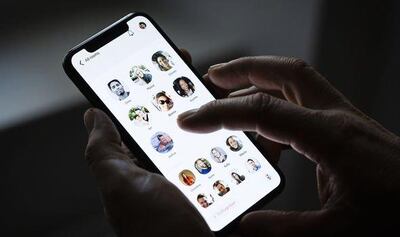There's a new app making waves on social media.
Part podcast, part group chat, part radio, Clubhouse is an audio-based social media platform that allows people to chat in theme rooms that disappear once the conversation is over.
Anyone on the platform can start a room. The room's hosts lead and moderate the conversation, while participants can either listen quietly or raise their hands to interject.
The app is currently invite-only, meaning you need a member to set you up, and is only available on iOS. The company is getting ready to release its Android application and hire more staff to open it up to a global audience.
Launched in March 2020 in Silicon Valley by entrepreneur Paul Davison and former Google engineer Rohan Seth, Clubhouse is already valued at $1 billion.
Most of its growth, and value, came in the past two months when celebrities like Oprah Winfrey, Drake and even Tesla CEO Elon Musk joined the platform, causing it to grow from a few thousand users to six million.
Why is it so popular?
Clubhouse is taking advantage of FOMO (fear of missing out).
Those who haven't yet been invited, or do not possess an iPhone, wonder what it is like and join an exponentially-growing waiting list. Early users, enjoying the beta version of the app, know that if they are not online when an interesting conversation happens, they miss it. So they set reminders and turn on notifications to make sure they don't miss their favourite hosts.
Furthermore, the Covid-19 pandemic has deeply changed the way we spend our free time.
Bored and confined into our homes, we find ourselves spending more and more time on the internet and in particular, on social media.
It is not a coincidence that 2020 was the most lucrative year in history for tech companies: Facebook grew by 33 per cent, Apple recorded an 81 per cent increase in profits, Amazon's revenues surged by 77 per cent.
Zoom grew by 396 per cent in 2020, with 300 million people using the platform daily. On Zoom, people worldwide reinvented the concept of social entertainment: from cooking classes, to book clubs, marriages, and game nights, we all spent hours on the platform, trying to staying connected with our friends and families.
Social media giants soon incorporated video-chat features in their app and tested new products to meet their users' new needs of sociality. Facebook introduced 'Messenger Rooms', a video chat service that can host up to 50 people at a time. Whatsapp has increased the maximum number of people who can take part in a video call at the same time from 4 to 8. Instagram launched 'Cowatching' a new feature that allows people to browse Instagram feeds together with their friends over video chat. Twitch introduced 'Squad Streams' allowing four creators to go live and stream together in one window.
In this crowded environment, Clubhouse has thrived, climbing app stores' rankings by filling the void left by conferences. On the app, users get the chance to interact, learn from and discuss with influential people in their niches, as they would normally do in person.
Finally, Clubhouse offers for the first time in decades, a direct confrontation between individuals deprived of the esthetical and visual aspects.
Mean comments, trolls and ads have no place on the app which is, for now, a safe haven where users are free to meet and share opinions.
Will it be a success or a failure? Too early to say. We will have to wait and listen.


